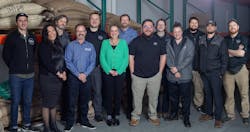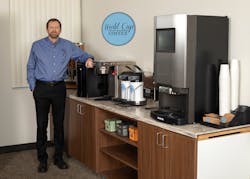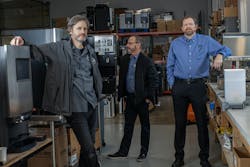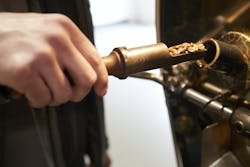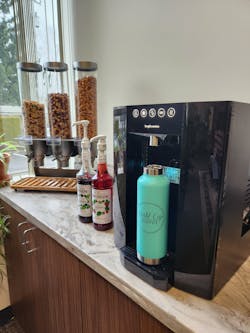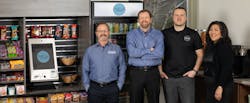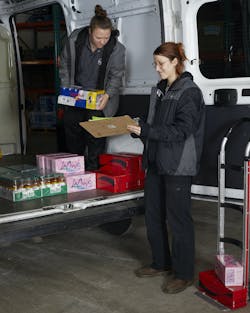Brewing up success: Portland-based World Cup Coffee thrives in a competitive Oregon market
The Pacific Northwest is an area of the U.S. known for its quality coffee. In a market that is coffee-centric, it takes a lot for an office coffee service (OCS) business to stand out, yet for nearly four decades, World Cup Coffee, based in Portland, Oregon, has been doing just that. Led by Dan Welch, World Cup Coffee has landed a name and a reputation for itself as a company that provides both unbeatable service and an incredibly good cup of coffee.
Since 1985, World Cup Coffee has also proven that it’s not afraid of a challenge or change, from starting its own roasting operation in 1993 to opening its first micro markets in 2022. World Cup Coffee continues to thrive through its strategic industry partnerships, customer-focused innovations and service-centered values.
A family business
The history of World Cup Coffee starts with Dan Welch’s dad, Don. With prior experience in the vending and OCS industry, Don purchased Diversified Refreshment Systems (now known as World Cup Coffee) in 1985. The company began with one OCS route, some vending machines and blood pressure machines. At the age of 15, Dan began doing odd jobs around the business for his dad, and when he could drive, he became a route driver. “It was good for me because I could do it after school, and that continued as I was going through college as a business student,” said Dan.
Putting his business knowledge to use, Dan started doing the books for his dad and learning the business side of the operation as well. “We were doing the pegboard method, and I would do accounts receivable and payable. It really gets you to understand the numbers of the industry.”
For many years, the company operated as a three-man team: Don as administrator, Dan as a route driver and Steve Williams as a service technician, albeit they wore many other hats, too.
“Steve was an instrumental part of our success,” said Dan. “He was a lifetime employee who served at the company from its start up until his retirement a year ago. When he retired, it was a big loss for the company.”
Steve shared his knowledge of troubleshooting and fixing equipment with Dan. “A lot of what I learned from my dad and Steve about the service side of things is just try. That carries over into a lot of things. If you just try and if you’re not afraid to turn a screwdriver, you’re probably going to get it right,” he said. “Just make sure you turn the water off and unplug the machine. Everybody causes a flood and everybody gets electrocuted at one point in their career,” he added with a laugh.
From the very beginning, service has been one of the top values at the company and one thing Dan has striven to continue since taking the helm in 2012. In fact, he aims to meet service requests within an hour. “Service is everything,” he said.
Of the 16 employees now at World Cup Coffee, 25% are service technicians. The company operates six routes, going on seven. “We just got an account in Bend, 160 miles away, that is broadening our reach and service capabilities,” said Dan. “We have always prided ourselves with our service capabilities, so we have expectations for how we respond to maintenance requests, and this is a new challenge that we are welcoming.”
The team’s deep commitment to service stems from the desire to meet customers’ needs and wants and to sell a quality product. And as they learned early on, being in such a competitive market, they weren’t afraid to try new things and pivot if something wasn’t working. “Back in the day, we did vending,” Dan said. “But [vending] was very challenging, and we got away from that, gladly.” In 1990, they decided they wanted to focus solely on OCS. “And we wanted to do it better than anybody else,” he added.
Innovation keeps the wheels turning
In order to provide the best cup of coffee to their customers, Don, Dan and Steve decided to begin roasting their own coffee in the early 1990s. “We were always thinking of ways we could improve the company,” said Dan. “People were demanding higher quality coffee, and it was a trend we realized was not going away. Good coffee and good service breed more business, and that’s what we wanted to continue.”
They attended the 1995 Specialty Coffee Association of America trade show and purchased roasting equipment. Dan began going to classes to learn how to roast and buy green coffee. Soon, they were fashioning their own blends. Today, their coffee is roasted fresh by Chris Phillips, their dedicated roaster, the day before it’s delivered to customers. The World Cup Blend and Vienna dark roast are their best-selling coffees.
Roasting its own beans certainly is one big way World Cup Coffee stands out among the competition. “If you’re a roaster, you can walk the talk,” said Dan.
They kept looking forward to even better ways to get a cup of quality coffee. “When National Vendors made a single-cup brewer called the Genesis, we got that because customers could make cappuccinos, lattes and mochas, which they loved.”
The company then began working with de Jong Duke, installing its Virtu machines. “The functionality [of the machines] was amazing, and the reliability is fantastic,” said Dan. “The single-cup business has been fabulous for us, in terms of how much we’ve gotten out there. I didn’t think it would be that big.”
Some of the company’s best success stories have been placement in lobbies of apartment complexes. “It is something where if one apartment gets a Virtu, another one wants one. In terms of hospitality, it’s a small thing for their P&L.”
Dan stresses the importance of properly training as many of the onsite employees as possible to keep the equipment filled and cleaned daily. “If you don’t train onsite employees, you’re going to have too many service calls,” he advised.
World Cup’s coffee retail stores boost OCS exposure
It’s not often that an OCS operator also owns brick-and-mortar retail stores, but that was the case when World Cup Coffee opened its first coffee shop in 1999. Dan went through espresso training, and they eventually ended up with four retail locations over 20 years.
“Retail really helped us get a public face to the coffee,” said Dan. “We got good local press for the quality of our coffee, and folks in the office would recognize our coffee because they had visited one of our retail locations. It also helped because people in Portland really like to support local.”
However, the COVID-19 pandemic collapsed World Cup Coffee’s retail business, like many others. Rather than rebuild, Dan and his team focused their efforts and attention on areas in which he has seen better growth. “Retail operations have changed where you really have to have a food element, and I don’t want to be a cafe or a sit-down restaurant,” he said. “We are doing so well with OCS – better than ever – and with the growth of micro markets and pantry business there really isn’t an incentive to move back to retail.”
Partnerships aid diversification
After COVID shut down the company’s retail stores and its gross revenues plummeted 90-95%, Dan knew he had to look at other ways to expand the business he already had. The team looked at locations they were servicing with OCS and how they could expand their footprint with existing accounts. They started pantry service and micro markets with a sense of urgency and focused on water filtration and carbonated water offerings.
“We are seeing sparkling water become a desirable thing to have in the office environment, as well as touchless dispensing,” said Dan. To provide these offerings to consumers, World Cup Coffee has begun partnering with Borg & Overström. “I think their equipment is beautiful, and their functionality is fantastic. They have a willingness to make it work for us,” he said. “Some companies don’t pay us much attention because we are considered a ‘small’ operation, but Borg & Overström doesn’t treat us that way.”
Strategic partnerships such as this is one thing Dan points to when he discusses the company’s success throughout the years. He notes that his partnership with 365 Retail Markets is a large reason his micro market implementation has been successful.
World Cup Coffee opened its first micro market in 2022 after one of their OCS clients lost its micro market provider. “They asked if we could do it and that’s when we knew it was time to enter micro markets,” he said.
Although he had known about micro markets for about a decade before making the leap, Dan never felt like the time was right to open one until after the economy began improving after COVID-19.
“There was some fear and trepidation from some in the company as we got started, and that’s normal, but that’s when our general manager Mark Wilkerson and I said, ‘We’re doing this, and it’s going to be a success. This is who we are partnering with, and it’s going to go well because we have the same goal in mind.’”
World Cup Coffee began working with 365 Retail Markets after meeting at the NAMA Show. “They were very supportive right away, and they desired us to have success, and that came across when talking with them,” Dan said.
World Cup Coffee currently operates three micro markets, with plans on adding more. The biggest challenge faced so far has been the learning curve for the employees. “Our operations manager Kevin did a fabulous job organizing the current markets so that it’s affordable for the clients and profitable for us,” said Dan. “The biggest challenge is that we’re learning new procedures and backend software. We haven’t mastered micro markets yet, but we’ll get there. Jessica Seo in our office is making fabulous strides in programming and understanding the back end of the software.”
So far, Dan has been extremely happy with his partnership with 365. “They are very willing to help us get our feet off the ground and educate us,” he said.
Dan is cautiously optimistic with his current micro market success. “I don’t want to make too many mistakes, but I know it’s going to take a couple of years to get ourselves in a good rhythm.” To curb potential loss, World Cup plans to add Panoptyc security systems, which combine machine learning and data analysis to catch theft.
“Along with Panoptyc, we have been talking with G & J Marketing and Sales on quality products and merchandising in a market. We’ll be attending the NAMA Show in May, and we have a meeting set with Translucent to get better education on how they can assist with market operations and design,” Dan said.
After leaving vending machines so long ago, Dan was also hesitant to get back into handling food again. When it comes to fresh foods, he once again looks to strategic partnerships for success. At first, when the company began offering fresh sandwiches in markets, he realized the presentation wasn’t up to par with his expectations.
“Plastic-wrapped sandwiches with a sticker might sell, but it doesn’t look good,” he said. “So, we realized we had to improve our product.” They began working with a local deli that has better presentation. Despite a higher price point, Dan believes it will pay off and is glad the local company is willing to work with World Cup as they grow their micro market business.
“Our presentation and diversity of our product will be some of our growing pains before we get good at micro markets,” he said. Dan’s advice to other operators hesitant to get into micro markets is to start getting educated. “There’s so much information out there. Start small and spend 15 minutes listening to the numerous podcasts available, like Automatic Merchandiser’s Vending & OCS Nation podcast hosted by Bob Tullio. You can also attend industry trade shows and education sessions.”
Experience is an asset
Experience in the industry is one of World Cup Coffee’s biggest assets going forward. “I’ve learned along the way that mistakes will happen,” said Dan. “Owning a business is a stressful thing. We’re going to get accounts, and we’re going to lose accounts. Accounts are sometimes a revolving door, and we can’t control everything. Mistakes are opportunities to further succeed.”
Since the early days of the business, Dan has tried to differentiate the company from those operators focused solely on price. “We have defined ourselves by service, by being there within an hour and by keeping the equipment clean, full and working,” he said. “We have been doing the things that were not expected as an OCS company.”
This focus on service has lasted throughout the company’s 40 years. Although World Cup Coffee has innovated and diversified offerings, everything they do comes back to service. “If you’re not meeting and exceeding your customers’ needs, then you’re just another player in the game,” Dan concluded.
About the Author

Adrienne Klein
Contributing Editor
Adrienne Zimmer Klein is a freelance writer with a background in the vending, micro market and office coffee service industry. She worked as an associate editor and managing editor at Automatic Merchandiser and VendingMarketWatch.com from 2013 until 2017. She is a regular contributing writer at Automatic Merchandiser.
